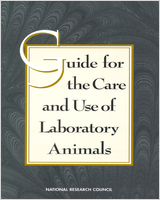NCBI Bookshelf. A service of the National Library of Medicine, National Institutes of Health.
National Research Council (US) Institute for Laboratory Animal Research. Guide for the Care and Use of Laboratory Animals. Washington (DC): National Academies Press (US); 1996.

Guide for the Care and Use of Laboratory Animals.
Show detailsPublic Health Service Policy on Humane Care and Use of Laboratory Animals
The Public Health Service (PHS) Policy on Humane Care and Use of Laboratory Animals was updated in 1996. In the policy statement, the PHS endorses the U.S. Government Principles for the Utilization and Care of Vertebrate Animals Used in Testing, Research, and Training (reprinted below), which were developed by the Interagency Research Animal Committee. The PHS policy implements and supplements these principles. Information concerning the policy can be obtained from the Office for Protection from Research Risks, National Institutes of Health, 6100 Executive Boulevard, MSC 7507, Rockville, MD 20892-7507.
Principles for the Care and Use of Animals Used in Testing, Research, and Training
The principles below were prepared by the Interagency Research Animal Committee. This committee, which was established in 1983, serves as a focal point for federal agencies' discussions of issue's involving all animal species needed for biomedical research and testing. The committee's principal concerns are the conservation, use, care, and welfare of research animals. Its responsibilities include information exchange, program coordination, and contributions to policy development.
U.S. Government Principles for the Utilization and Care of Vertebrate Animals Used in Testing, Research, and Training
The development of knowledge necessary for the improvement of the health and well-being of humans as well as other animals requires in vivo experimentation with a wide variety of animal species. Whenever U.S. Government agencies develop requirements for testing, research, or training procedures involving the use of vertebrate animals, the following principles shall be considered; and whenever these agencies actually perform or sponsor such procedures, the responsible Institutional Official shall ensure that these principles are adhered to:
- I.
The transportation, care, and use of animals should be in accordance with the Animal Welfare Act (7 U.S.C. 2131 et seq.) and other applicable Federal laws, guidelines, and policies.1
- II.
Procedures involving animals should be designed and performed with due consideration of their relevance to human or animal health, the advancement of knowledge, or the good of society.
- III.
The animals selected for a procedure should be of an appropriate species and quality and the minimum number required to obtain valid results. Methods such as mathematical models, computer simulation, and in vitro biological systems should be considered.
- IV.
Proper use of animals, including the avoidance or minimization of discomfort, distress, and pain when consistent with sound scientific practices, is imperative. Unless the contrary is established, investigators should consider that procedures that cause pain or distress in human beings may cause pain or distress in other animals.
- V.
Procedures with animals that may cause more than momentary or slight pain or distress should be performed with appropriate sedation, analgesia, or anesthesia. Surgical or other painful procedures should not be performed on unanesthetized animals paralyzed by chemical agents.
- VI.
Animals that would otherwise suffer severe or chronic pain or distress that cannot be relieved should be painlessly killed at the end of the procedure or, if appropriate, during the procedure.
- VII.
The living conditions of animals should be appropriate for their species and contribute to their health and comfort. Normally, the housing, feeding, and care of all animals used for biomedical purposes must be directed by a veterinarian or other scientist trained and experienced in the proper care, handling, and use of the species being maintained or studied. In any case, veterinary care shall be provided as indicated.
Footnotes
- 1
For guidance throughout these Principles. the reader is referred to the Guide for the Core and Use of Laboratory Animals prepared by the Institute of Laboratory Animals Resources, National Academy of Sciences.
- Public Health Service Policy and Government Principles Regarding the Care and Us...Public Health Service Policy and Government Principles Regarding the Care and Use of Animals - Guide for the Care and Use of Laboratory Animals
Your browsing activity is empty.
Activity recording is turned off.
See more...